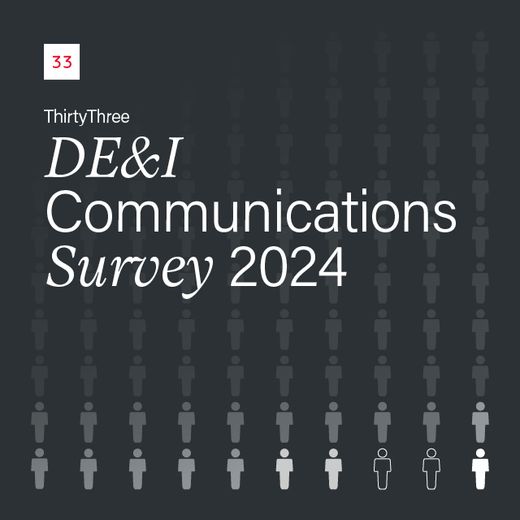How your DE&I communications influence candidate job choices
Learn which content is the most trusted and effective.

- 5 minute read
- DE&I
- Research
- Inclusive comms
A quick Google search and you’re sure to find a plethora of articles on the importance of diversity, equity, and inclusion (DE&I) in candidate communications. Many of these articles make recommendations which blur the lines between policy and communications. The trouble is that for the most part they are heavily based on US data.
It’s a very different market here in the UK and the expectations and experiences of DE&I are not the same, nor are the policies we have in place.
At ThirtyThree, we wanted to understand how DE&I communications can impact job seekers and employees in the UK, and what that means for employer brand and talent acquisition professionals. We surveyed 340 UK-based adults in full-time employment, making sure that we had a sample that was broadly representative of gender, ethnicity, age profile and employment sector for the wider working-age population.
The results explore why we should care about DE&I, how businesses can show they value it, and which content candidates trust the most. Download the full report and read on to find out more.
85%
of women said employer DE&I commitments influence their job choice.
Job seekers are actively looking for evidence that employers value DE&I
We started by asking ‘when choosing whether to apply for a job, how important is it that a company has a commitment to diversity and inclusion?’
8 in 10 respondents said that it was at least somewhat important that a company has a commitment to DE&I, and this went up to 85% for female respondents and 82% for ethnic-minority respondents.
When we looked at the results based on age, not a single respondent in the 18–24-year-old bracket responded with ‘not important’.
Our research shows that the majority of candidates will be looking for evidence that an employer values diversity and inclusion. DE&I content isn’t just for those people with protected characteristics. It can resonate with everyone.
We also found that secondary factors linked to DE&I are important to candidates. In particular, policies which support wellbeing are shown to impact decision making. 92% of respondents said it was at least somewhat important when deciding to apply.
So, yes diversity and inclusion matter to job seekers – particularly when you can prove that you’re an empathetic employer that cares about the lives of its employees.
Detailed policies and benefits are the most effective way to show you value DE&I
We also explored how to show you value DE&I. Based on our experience and expertise, we came up with a list of 12 ways of communicating about diversity and inclusion. These focused on content and activation-based activities. When asked ‘how important is it that a company website or social channels do the following…’ we found that each option was seen as important by over 8 in 10 people.
When we looked at how each choice ranked, we discovered that communications that referenced tangible policies and interventions outscored the most explicit and direct options, like ‘showcasing a diverse workforce’. When it came to imagery, 80% of respondents believe that only real employee photos should be used. And the clearest winner was again speaking about the importance of employee wellbeing.
One of the most interesting learnings here was that over 6 in 10 respondents said they’d be more likely to apply if the company did ALL of the activities we included. So, while some might be quicker wins than others, it’s worth thinking of a more holistic approach to your DE&I communications.
80%
of respondents believe employers should only use imagery of real employees.
Content from employees is the most trusted
We wanted to understand who candidates are most likely to trust when a company talks about its commitment to diversity and inclusion. Is it better to have a message from the CEO, from a D&I leader, the team managers or employee stories?
Our research showed that when it comes to DE&I, 70% of people trust content from employees. In fact, the CEO ranked the lowest in terms of trustworthiness.
What this shows is that people are looking for social proof – real stories from real people that they can relate to. The more senior and detached from the day-to-day running of the company a person is, the less relatable they will be. And these findings were only more pronounced among our female-identifying respondents.
Our three key takeaways
- Don’t just say it – show it. Evidence your commitment to DE&I through policy, resources and initiatives.
- It’s not one-size-fits-all. Use a variety of different content and activations to reach different audiences in different ways.
- Keep it real. Include your employees’ voices in your communications to offer social proof and build trust in your company.
Show how much you value DE&I
Are you confident that your communications are inclusive? Struggling to know where to invest your time and resources? Our inclusive comms audit – Unlocked – can help you know what to say and where in just a few weeks. Find out more diversity@thirtythree.co.uk.





